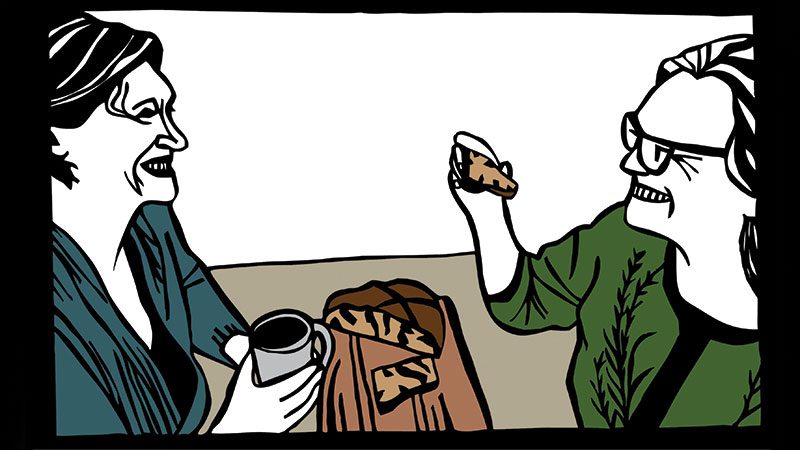Baking for others is a gift to yourself
Written by Cynthia Lair, guest contributor, original papercuts by Sara McMahon
This article was originally published in November 2021

For many years, I baked a loaf of sourdough bread at least once a week for my own purposes: My family’s meals. The cookbook I was writing. The baking classes I taught.
After my book on sourdough bread came in 2019 (see “Life in Your Loaf”), I imagined that eventually, someday, when I had less to do, I would get into the habit of baking bread for others. Then came COVID-19, and my calendar was reduced like an intense sauce.
With limited human contact, that tendency toward self-absorption had free reign—overstimulated by own mind, hounded by screens, discouraged by news, politics, and all the “us vs. them.”
Looking for an antidote, I started pouring through all the spiritual books I had put on hold on my nightstand. The first thing to pop up was this:
“Never resist a generous impulse”
— Dalai Lama
And some version of that sentiment seemed to appear everywhere.
To find balance, and make good on my impulse, I began baking and delivering a loaf of whole grain sourdough bread for someone every week. I would place the brown paper bag near the door, ring the bell, and back up my double-masked self.
After the recipient took the bag and peeked inside, we had a six-foot chat, sometimes leading to a distanced walk. The benefits for me were enormous. The baking, giving and delivering forced me to shift my attention from self to others. And now, as we enter a new normal, I hope this never stops.
If this idea of practicing “gift-baking” resonates, let’s talk! After sixty-plus deliveries, here are my takeaways.
Before baking
Perhaps someone pops into your head as a perfect recipient. Nice. More will follow. Early on, choose people you know and have a desire to connect with (as opposed to paying off an obligation). Family and friends, of course, but don’t forget the person who cuts your hair, your veterinarian, your exercise instructor, or maybe your child’s teacher. My daughter is 31, and I took a loaf to her kindergarten teacher. What becomes clearer and clearer to me is how many ways I am taken care of by others.
When you contact your friend, pose the gift-bake as an offer, don’t assume they want it. For whatever reason (health issues, restrictions?) they might not. That happened to me twice!
When arranging the time for handoff, ask if there might be space for a conversation or a walk instead of expecting it.
Agree on a delivery time that works for you both. Be clear about your intention.
Explain that reciprocity is not expected. Maybe even tell them that this practice is keeping you sane; that they are helping you. However: If they insist on reciprocating, accept!
During baking
When you gift-bake, choose a recipe that you truly enjoy—for me it was whole-grain sourdough bread, for you it might be any other specialty. Once you have a plan, set aside the time. Don’t squeeze it in. Remember, all of this is for you, too!
Keep your recipient in mind; something you appreciate about them.
As you work, use all five senses to keep you in the present moment. Enjoy the respite from screens and needless anxiety. Take a moment to observe how this practice is enhancing your life. The food will taste better.
The delivery
Make your own ritual. Mine took shape gradually. Now, the bread must go in a recycled paper bag, a good reuse for the small stash I keep on hand. I decorate an index card with crayons and glue storage instructions to the back. Your packaging can be simple or ornate, just make sure the process percolates joy.
On the way to your friend’s place, consider the upcoming conversation; questions you might ask about their life (as opposed to how you will explain your current state). Do you know where they grew up? Siblings? Don’t construct an interview, just make yourself curious. And listen without forming your next response as they talk. Every detail they impart is a gift to you. Recognize that and take it in. Everything that lands is a gift back to them.
Also, remember, each person receives gifts differently. Some gush, others get quiet, some feel little awkward. I took a loaf to my friend Matt and his wife Elizabeth. At the time they had been living with, and taking care of, his 99-year-old mother, Bettie. The next day I got a voicemail from Bettie who told me, clear as a bell, that mine was the best bread she had ever eaten in her life. This touched my heart beyond measure; made all the previous and yet-to-come gift bakes worth every second of effort.
The circulatory nature of gift-baking
I listened to an online interview from Unexpected Productions with Patricia Ryan Madson, author of the book “Improv Wisdom.” She said, “Life gets better when our default is generosity, not self-absorption and skepticism.”
Every step of gift-baking is an opportunity for gratitude and generosity. When choosing who to bake for, take in how many people feed your life. While baking, treasure your talent, your kitchen, the tools, the ingredients. Heck, just look at your beautiful hands and watch them work. And after you have delivered your gift? Well, you have connected with another human, given a friend some nourishment, and discovered another piece of their story. Give and get. Repeat.
Cynthia Lair is the author of “Feeding the Whole Family” (Sasquatch Books), now in its fourth edition, “Feeding the Young Athlete” (Readers to Eaters, 2012) and “Sourdough on the Rise” (Sasquatch Books, 2019). She was on faculty at Bastyr University from 1994 to 2020. Currently, she teaches and performs improv with Unexpected Productions at the Market Theater.
Sara McMahon is a Seattle-based artist. Find her on Instagram at @saramacpapercuts.
